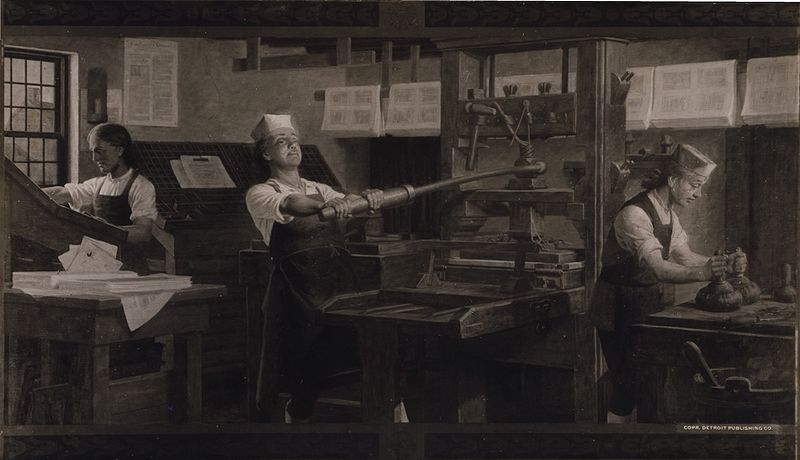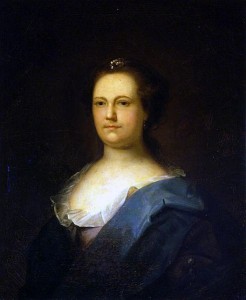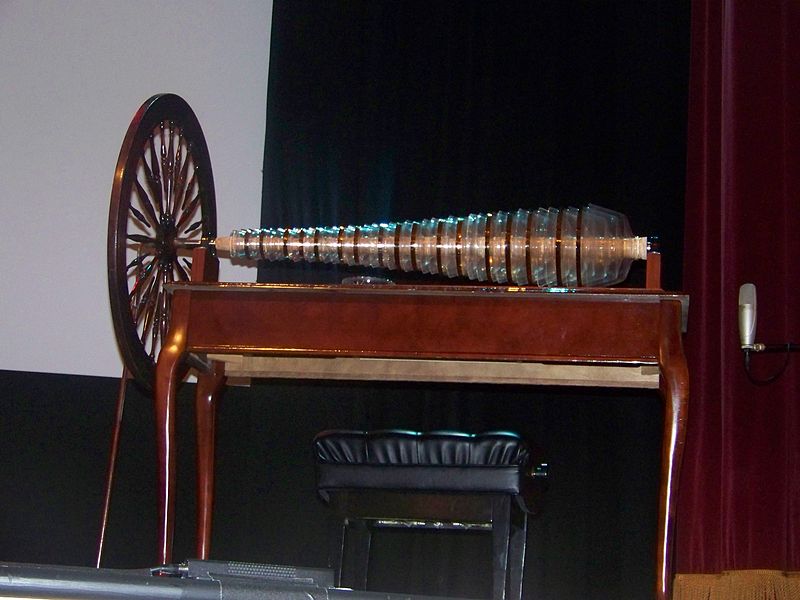 Benjamin Franklin was one of the seven key “Founding Fathers of the United States of America.” The term “Founding Father” was coined by Warren G. Harding during his inauguration as President of the United States. The term came to describe all those who were involved in the struggle to create an independent United States, who actively participated in drafting the Constitution, and who eventually signed the United States Declaration of Independence in 1776. The six men who are known as a Founding Father of the United States include:
Benjamin Franklin was one of the seven key “Founding Fathers of the United States of America.” The term “Founding Father” was coined by Warren G. Harding during his inauguration as President of the United States. The term came to describe all those who were involved in the struggle to create an independent United States, who actively participated in drafting the Constitution, and who eventually signed the United States Declaration of Independence in 1776. The six men who are known as a Founding Father of the United States include:
• George Washington (who presided over the drafting of the Constitution and served as the first President of the United States),
• Thomas Jefferson (who was George Washington’s Secretary of State and later served as the third President of the United States),
• John Adams (who became the second President of the United States),
• James Madison (who became the fourth President),
• Alexander Hamilton (who was George Washington’s aide-de-camp during the American Revolutionary war and later served as Washington’s Secretary of the Treasury), and
• John Jay (who was an American diplomat during the American Revolution and later served as Washington’s Chief Justice).
Benjamin Franklin is recognized as the only Founding Father who signed all the four major documents which led to the formation of the United States, namely: the Declaration of Independence, the Treaty of Alliance, the Treaty of Paris, and the United States Constitution.
Early Life
 Benjamin Franklin was born on January 17, 1706 in Boston, Massachusetts. His father, Josiah, was a soap and candle maker from England who immigrated to Boston. Franklin’s mother, Abiah Folger, was actually Josiah’s second wife. Franklin had ten siblings and seven step-siblings. Both his mother and father were Puritans (members of a Protestant movement) who believed and valued hard work and equality. These traits guided Benjamin Franklin all throughout his entire life.
Benjamin Franklin was born on January 17, 1706 in Boston, Massachusetts. His father, Josiah, was a soap and candle maker from England who immigrated to Boston. Franklin’s mother, Abiah Folger, was actually Josiah’s second wife. Franklin had ten siblings and seven step-siblings. Both his mother and father were Puritans (members of a Protestant movement) who believed and valued hard work and equality. These traits guided Benjamin Franklin all throughout his entire life.
Benjamin Franklin’s family was poor, young Benjamin was only able to attend two years of school. But despite stopping school at the age of ten, Franklin made up for it by being an avid reader.
Franklin’s brother, James, was a printer and at 12 years of age, Franklin worked as an apprentice. In 1721, when Franklin was only 15 years old, his brother founded “The New-England Courant” which is now considered as the oldest and the first independent American newspaper. Franklin, who was not allowed to write articles for the newspaper, wrote letters using “Mrs. Silence Dogood” as his pseudonym.
Mrs. Silence Dogood wrote a total of 14 letters, all of which were published. The letters were usually left at Franklin’s brother’s doorstep every two weeks. The letters of course were controversial and nobody knew, not even Franklin’s brother, who this Mrs. Silence Dogood really was. That early, Franklin manifested brilliance and ingenuity. He was able to create such a realistic character that some of the readers had sent offers of marriage to this Mrs. Silence Dogood. Eventually, of course, Franklin’s brother found out the truth and this forced Franklin to stop writing, stop working, and run away.
Leather Apron Club – Junto
Benjamin went to Philadelphia, Pennsylvania where he continued working for several printing outfits, but he seemed discontented and dissatisfied. In 1727, when Franklin was 27 years old, he established a club called “Junto” or “Leather Apron Club.” He and five of his friends banded together for the purpose of mutual improvement through debates and exchange of ideas. Because of Franklin’s friendly and sociable nature, a lot of businessmen, merchants, and other people from different fields started participating in the Junto’s informal Friday meetings. The discussions usually revolved around questions which Franklin himself espoused, and some of the popular concepts during these Friday meetings lay the foundation for the development of modern-day volunteer firefighters, night security or night watchmen, and even public hospitals.
The Junto also gave birth to the Library Company of Philadelphia. Like Franklin, all the Junto members were avid readers but because books were very expensive, Franklin thought of the idea of chipping in money to buy books that everyone could read. What was first conceived as a common subscription library for the Junto members then became a non-profit organization which held the most number of significant and valuable collections of historical manuscripts and other printed materials. In fact, the size of its current collection is close to 600,000 rare books. All these from a young man who was not able to finish formal schooling!
Pennsylvania Gazette & Masons
 In 1728, Franklin printed and published his own newspaper called “The Pennsylvania Gazette.” He also contributed several articles using different pseudonyms. It became one of the leading and most successful newspapers before the American Revolution. Because of all his endeavors and achievements, Franklin started gaining prominence and fame. He was welcomed into the Masonic Lodge in 1731 and became its Grand Master in 1734. Also in that year, Franklin edited the Masonic manuscript titled “Constitutions of the Free-Mason” by James Anderson and published the very first American Masonic book. This book set to standardize the rites, practices and rituals of Freemasonry. Freemasonry is a form of fraternal organization whose early beginnings are traced back to Europe and the Masonic lodge is its basic unit. A Grand Master is the leader who presides over the Lodge of his jurisdiction. Franklin was a Freemason from this point on until his death.
In 1728, Franklin printed and published his own newspaper called “The Pennsylvania Gazette.” He also contributed several articles using different pseudonyms. It became one of the leading and most successful newspapers before the American Revolution. Because of all his endeavors and achievements, Franklin started gaining prominence and fame. He was welcomed into the Masonic Lodge in 1731 and became its Grand Master in 1734. Also in that year, Franklin edited the Masonic manuscript titled “Constitutions of the Free-Mason” by James Anderson and published the very first American Masonic book. This book set to standardize the rites, practices and rituals of Freemasonry. Freemasonry is a form of fraternal organization whose early beginnings are traced back to Europe and the Masonic lodge is its basic unit. A Grand Master is the leader who presides over the Lodge of his jurisdiction. Franklin was a Freemason from this point on until his death.
Family Life
 On September 1, 1730, Franklin took Deborah Read as his common-law wife. Deborah Read was then married to a man named John Rodgers who became a fugitive, leaving Deborah incapable to legally marry Franklin. Franklin and Deborah had two children. Francis Folger Franklin was born on October 1732 but died of smallpox four years later in 1736. Sarah Franklin was born in 1743 and she eventually gave Franklin 7 grandchildren; it was she who also took care of Franklin in his old age.
On September 1, 1730, Franklin took Deborah Read as his common-law wife. Deborah Read was then married to a man named John Rodgers who became a fugitive, leaving Deborah incapable to legally marry Franklin. Franklin and Deborah had two children. Francis Folger Franklin was born on October 1732 but died of smallpox four years later in 1736. Sarah Franklin was born in 1743 and she eventually gave Franklin 7 grandchildren; it was she who also took care of Franklin in his old age.
Franklin also had an illegitimate son named William who was born around the year 1731. The identity of his mother was never revealed or traced. It was said that his mother was a prostitute but some say that his mother was really Deborah. William lived with Franklin and Deborah and he was often the companion and assistant of Franklin in many of his sojourns and experiments. The falling out between father and son came because of their different political beliefs. While William staunchly supported the colonies, even serving as the last colonial Governor of New Jersey, Franklin believed and fought for patriotism. William was eventually exiled to Britain where he also died. Deborah died of a heart attack in 1774 while Franklin was touring Europe.
Inventions Leading to Improvement & Efficiency
Aside from being a prolific writer, a publisher, a Mason, and a prominent member of society, Franklin was also known to be an impressive inventor. He said that his scientific experiments were for the purpose of improving humanity and increasing efficiency.
In 1741, Franklin invented the Franklin stove. It was an improvement of the ordinary fireplace in that it was lined with metal and it had a design meant to produce more heat and less smoke. Benjamin Franklin has also been credited with inventing the eyeglasses or bifocals, although the exact date of this invention has never been established.
In 1749, Franklin invented the lightning rod (also known as the Franklin rod) as part of his experiments with electricity. In 1750, he proposed to prove that lightning was in fact electricity by publishing an experiment wherein he would fly a kite into a storm. On June 15, 1752, Franklin, together with the help of his son William, conducted sparks from a cloud when they tested the kite experiment. Luck was on Franklin’s side with this experiment because others who tried the now famous kite experiment were killed from electrocution. Because of his many experiments with electricity, the physical unit of electric charge in the metric or CGS system (or the centimeter-gram-second system) was named after him: one franklin (Fr) is equal to one electrostatic unit of charge (esu).
Franklin invented the armonica or musical glasses in 1762, a musical instrument made of wine glasses filled with water to create a tune. Franklin invented a new design for the instrument and  commissioned London glassblower Charles James to create his design. Famous classical musicians and composers like Tchaikovsky, Strauss, Bach, Beethoven, Mozart, and Handel created pieces using the armonica.
commissioned London glassblower Charles James to create his design. Famous classical musicians and composers like Tchaikovsky, Strauss, Bach, Beethoven, Mozart, and Handel created pieces using the armonica.
In 1770, through Franklin’s inquisitiveness and with the help of experienced ship captains, he was able to understand the circulation or current patterns of the North Atlantic Ocean and so he was able to publish a chart named the “Gulf Stream.” But because his chart strongly deviated against the standard ship route followed by sea vessels then, this chart was completely ignored. Only after many years later was it used to serve as guide in the navigation of seafarers. Franklin’s chart of the currents actually reduced sailing time by two weeks.
Franklin made several other observations on various phenomena, thus enabling him to make his own deductions and conclusions on subjects like meteorology, evaporation and cooling, the non-conductivity of ice, and others. These observations he duly took note of and had published.
But while Benjamin Franklin dabbled in numerous observations and experiments, he continued to take an active role in politics and public service.
Public Service
 In 1749, Franklin founded “The Academy and College of Pennsylvania.” This was considered the first American academy when it opened in 1751 with Franklin as its president. He was also elected to the Pennsylvania Assembly in 1751 and in that same year, Franklin founded the Pennsylvania Hospital which was the first hospital in the United States of America. In 1753 he became Deputy Postmaster General of North America. He revolutionized the postal system and made it more efficient by having mail sent out more often.
In 1749, Franklin founded “The Academy and College of Pennsylvania.” This was considered the first American academy when it opened in 1751 with Franklin as its president. He was also elected to the Pennsylvania Assembly in 1751 and in that same year, Franklin founded the Pennsylvania Hospital which was the first hospital in the United States of America. In 1753 he became Deputy Postmaster General of North America. He revolutionized the postal system and made it more efficient by having mail sent out more often.
Benjamin Franklin was also awarded honorary degrees from great institutions of learning like Yale, Harvard, University of St. Andrews, and Oxford University.
In the years that followed, Franklin traveled back and forth to Europe, participating in different assemblies. In 1775, on one of Franklin’s return trips to Pennsylvania, the American Revolution had already started. The militia was successfully winning over the British Army and Franklin had been unanimously voted by the Pennsylvania Assembly to be their delegate to the Second Continental Congress.
This Congress represented the thirteen colonies which planned and managed the war effort against Britain. In June 1776, Franklin was appointed to the “Committee of Five.” It was this Committee of Five that wrote and drafted the Declaration of Independence. The other members of the Committee were Thomas Jefferson from Virginia, Robert Livingston from New York, Roger Sherman from Connecticut, and John Adams from Massachusetts. The Declaration of Independence was passed and adopted by Congress on July 4, 1776. In essence, the Declaration of Independence declared independence for the thirteen colonies that were previously under the British Empire.
On July 1776, the United States Post Office was formed and Franklin was appointed the first Postmaster General of the United States, which was a natural choice since Franklin had previous experience serving in that position.
Franklin served as United States Commissioner or Ambassador to France from 1776 to 1785. Returning home in 1785, Franklin then took up the cause of abolition, even serving as President of the Pennsylvania Abolition Society. It was the Pennsylvania Abolition Society which paved the way and served as model to many anti-slavery movements and organizations.
On October 18, 1785, Benjamin Franklin was elected to the Supreme Executive Council of Pennsylvania as its President, a position similar to today’s Governor. He was re-elected to the said position two more times after his initial term. He served under this capacity through December 1788.
In 1787, several prominent ministers founded the Franklin College, in honor of Benjamin Franklin. It is now called the Franklin and Marshall College.
 On April 17, 1790, Benjamin Franklin died at the age of 84. He was an extraordinary man who displayed true patriotism and love for the country. He was as dedicated as he was humorous. His legacy is as enduring as the quotations he had coined. Some of them are:
On April 17, 1790, Benjamin Franklin died at the age of 84. He was an extraordinary man who displayed true patriotism and love for the country. He was as dedicated as he was humorous. His legacy is as enduring as the quotations he had coined. Some of them are:
“A penny saved is a penny earned.”
“Well done is better than well said.”
“Anger is never without a reason, but seldom with a good one.”